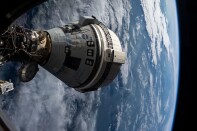This story is free to read because readers choose to support LAist. If you find value in independent local reporting, make a donation to power our newsroom today.
A planet parade of Venus, Saturn, Jupiter and Mars shines in the skies this month

Over the next few weeks, a stunning parade of planets will glow across the night sky, putting on a celestial spectacle that both amateur and seasoned stargazers can easily observe.
All month, four planets — Venus, Saturn, Jupiter and Mars — will appear to line up and be bright enough to see with the naked eye in the first few hours after dark, according to NASA. Uranus and Neptune will be there, too, but will require binoculars or telescopes to spot.
"These multi-planet viewing opportunities aren't super rare, but they don't happen every year, so it's worth checking it out," NASA added.

Since the beginning of January, Venus and Saturn have been drawing closer and closer to each other. The climax will take place Friday and Saturday, when the two planets will appear within just "a couple of finger widths' distance apart" from Earth's perspective, NASA said. (Though in reality, there are hundreds of millions of miles between them.)
Meanwhile, Mars is at "opposition" this month. That's when a planet and the sun are directly opposite each other with Earth in between. This celestial event happens about every two years for the red planet.
Opposition is "around the time when the planet is at its closest to Earth, making it appear at its biggest and brightest," NASA wrote.
For those planning to spot the cosmic lineup, NASA said Venus and Saturn will be visible in the southwest during the first couple of hours after dark. At that time, Jupiter will shine high overhead while Mars will rise in the east. A simple way to distinguish a star from a planet is that planets tend to shine steadily while stars twinkle, according to NASA.
In June 2024, a planet parade featuring Saturn, the Moon, Mars and Jupiter was on display in the morning sky but only two planets could be observed with the naked eye.
Copyright 2024 NPR. To see more, visit npr.org.










